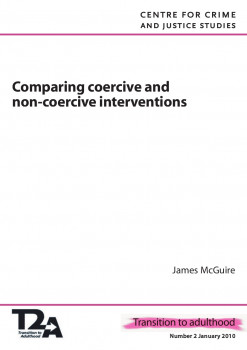Comparing coercive and non-coercive interventions

There is little or no benefit in the resort to incarceration and other forms of strict control for young people who break the law, according to a briefing from the Centre for Crime and Justice Studies.
In Comparing coercive and non-coercive interventions James McGuire, Professor of Forensic Clinical Psychology at the University of Liverpool, argues that the expectation that the problem of offending by young people can be solved by coercion and control is essentially illusory.
In the briefing, Professor McGuire:
- summarises basic evidence concerning the circumstances of youth justice, pointing to the facts that more young people are locked up in England and Wales than in any other member of the European Union and also that England and Wales have one of the highest incidence of imprisonment for under 18 year-olds in the world.
- provides a systematic overview of research findings on the outcomes of different kinds of direct work with young people who have repeatedly broken the law. McGuire argues that those who are dealt with more harshly go on to commit more harmful acts and presents evidence of interventions that, he argues, are less punitive but more effective.
- considers why the kinds of approaches most familiar in the law and order debate - the application of punitive sanctions - do not have the impact they are generally purported to have despite their widespread acceptance.
- discusses how to bridge the continuing gap between research findings and effective practice, and the implications of doing so for wider policy formulation.
Professor McGuire today said:
`Taking a step back and examining the available evidence dispassionately, it is difficult to avoid the conclusion that the policy of resorting to coercive methods is in large measure counter-productive. The question of why it continues to be pursued - indeed, why some voices recurrently call for yet more of it, presenting their arguments as more realistic and down to earth than those of opponents who are portrayed as "soft" - is increasingly difficult to understand.'
Commenting on the briefing Richard Garside, director of the Centre for Crime and Justice Studies said:
`Professor McGuire's briefing gives us an insight into what an effective youth justice policy might look like if it was based on the research evidence, rather than political positioning. The Centre for Crime and Justice Studies is a strong advocate of research evidence informing policy making and it is delighted to be publishing this very timely and important contribution by one of the country's top experts in the field of forensic clinical psychology.'